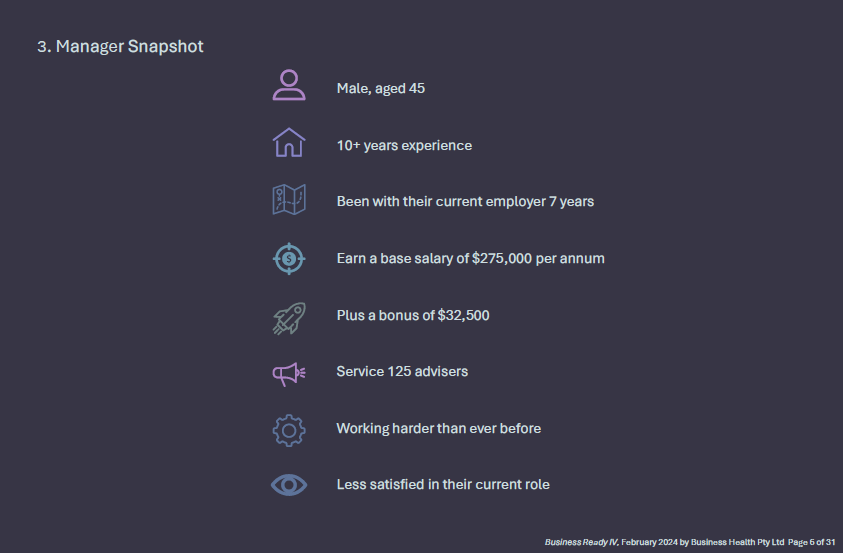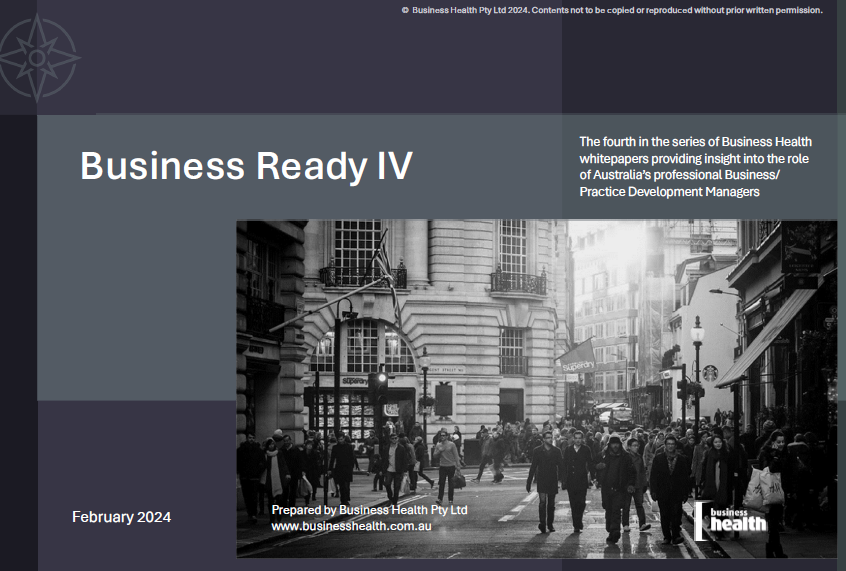There was strong reader interest this week in our report highlighting findings that sentiment amongst Australia’s BDMs and PDMs has deteriorated to the extent that there now appears to be a potentially alarming level of discontent…
Sentiment amongst Australia’s Business and Practice Development Managers has deteriorated to the extent “that there now appears to be a potentially alarming level of discontent,” according to a new report.
Business Ready IV, the fourth in the series of reports by Business Health, provides insights into the role of Australia’s professional BDMs (representing an institution) and PDMs (working for a licensee) and poses several questions for the industry.
The first question the firm highlights is whether the industry will see a manager exodus and if so, to where?
Business Health says while two thirds of managers reported their workload has increased, 81% stated their compensation has remained static. And:
- 38% do not believe they have the tools and training they need to do their job properly
- A third are not satisfied in their current role and only half rated the support they receive from their senior managers highly
…64% of managers are looking for a change in role and/or responsibilities in the coming three years…
Business Health says that “…given this, perhaps not surprisingly, 64% of managers are looking for a change in role and/or responsibilities in the coming three years.”
It adds that 45% have already been directly approached by a competitor about moving into a new development role.
The firm says if the industry does see a spike in manager movement, this will raise a number of issues including where will the replacement managers come from and how will ‘new to the role’ managers be trained.
It also asks if the relationship between adviser and manager becomes fractured “…what will this mean to the employer? Will weaker relationships lead to less support from advisers?”

Disconnect between managers and advisers?
The second question Business Health poses is whether the disconnect between managers and their advisers is widening?
It says when asked to identify their adviser’s top three areas of concern, in order of importance, managers listed:
- Regulation and compliance – yet only 22% of managers offer support in this area
- Attraction and retention of quality staff – less than half (46%) of managers include this as part of their service offer
- Pressure on margins and developing profitable businesses – 45% of managers do not provide assistance with business/strategic planning and half do not offer business coaching/advice support
…the value they add must be real and tangible and can only, in truth, be adjudged by the adviser…
The company says that as licensees, product manufacturers and investment platforms think through their optimal adviser proposition for the future “…it will be absolutely essential that their managers are skilled and supported to deliver services and solutions that advisers want and need. The value they add must be real and tangible and can only, in truth, be adjudged by the adviser.
An Overpaid Administration Resource?
Business Health’s third question is whether this role becoming an overpaid administration resource?
…with the average compensation package around $300,000 (plus on-costs) per annum, these managers are a valuable, but nonetheless expensive resource…
It notes that with the average compensation package around $300,000 (plus on-costs) per annum, these managers “…are a valuable, but nonetheless expensive resource. In order to ensure the maximum return on this significant investment, it is critical that the vast majority of their time is spent on high value activities.”
It says that as such “…it was concerning to see that two thirds (64%) of managers believe they spend too much time attending to administrative tasks.
“ Many also feel they are spread too thinly, being asked to service too many advisers, thus limiting their ability to add true value.”
Business Health says that given this, for many employers it may be worth reviewing:
- The effectiveness of performance management structures through which P/BDMs work – do managers have clearly defined roles, responsibilities and success measures
- The depth and breadth of solutions managers are expected to deliver – are we asking them to be across too many disparate specialist areas
- How many advisers/practices can an individual manager have deep business-to- business relationships with while still delivering meaningful and tangible value
- Can certain tasks be more efficiently handled by lower cost/salary solutions
Adviser Relationships
The report also notes that the number of advisers each manager services is largely dictated by whether they are a PDM working for a licensee or a BDM representing an institution.
…PDMs typically service between 51 and 100 advisers while 40% of BDMs have a panel of between 101 – 200 advisers and 43% service more than 200 advisers…
PDMs typically service between 51 and 100 advisers while 40% of BDMs have a panel of between 101 – 200 advisers and 43% service more than 200 advisers.
Business Health says while this is obviously a function of the types of services offered along with the time taken to deliver, it was interesting to note that both cohorts thought the number of advisers in their panel should be reduced.
“While two thirds (64%) of managers now conduct virtual meetings with their advisers on a monthly or quarterly basis, there remains a strong in-person component nevertheless, with 92% holding at least two adviser group functions per year,” the report says.








That’s a little sad because good a BDM is a hard to find. But what is a good BDM?
The role of BDM for life insurers has evolved over the years particularly with the growth of office-only BDMs, leaving the out-of-office BDMs, armed with the corporate credit card, to devote all their time to “duchessing” their favourite advisers. Frankly I don’t believe most risk advisers need to be visited by BDMs on a regular basis – maybe once every 18 months will suffice.
In my mind a good BDM is one who will solve MY problems, represent MY views to management and not automatically switch to defence mode when there is an obvious and systemic problem that needs attention. Excellent BDMs liaise between the adviser and, say, New Business, where most of the cost-cutting that insurers are engaging in at the moment has occured.
A poor BDM in my view is one who sees their role as primarily chatting up the 20% of advisers who give them 80% of the business on their books. A poor BDM rarely considers that the 80% of advisers who give them only 20% of business really should be the subject of a concentrated effort. But then that 20% of advisers ensure that the KPIs are met and the bonuses paid, so who cares.
And to be perfectly blunt, unless a BDM had some experiences an adviser, there is nothing they can legitimately do to “help me to increase my business”.
Secondly a poor BDM generally speaking is not prepared to accept criticism of his insurer employer over an obvious operational or managerial flaw in his employer’s business. Frankly these folks are a waste of space, and we should divert their salary towards paying more good people in New Business
A couple of companies have some real problems in retaining BDM’s and one has to ask why, given the more than adequate salary these people receive. There is nothing more frustrating than having to spend additional time over a problem before you can find the name of your latest BDM to take responsibility for your issue.
And if BDM’s are unhappy with their little lot in life, come and sit in the chair of a risk advisor full for a few months.
Great comment Ol’Risky! Spot on, every point. It flabbergasts me that the average remuneration for these guys is around $300K. I wonder if that sort of rort will last long as risk business continues to drop away. You know, as the life companies continue to abandon advisers, unjustifiably gouge higher premiums every year way beyond reasonable and sit smugly paying risk advisers less than subsistence level for writing their policies. I’d certainly want that sort of money if I had to be the hapless face fronting advisers every day with all that malfeasance going on. Just calling it as I see it . . .
Comments are closed.